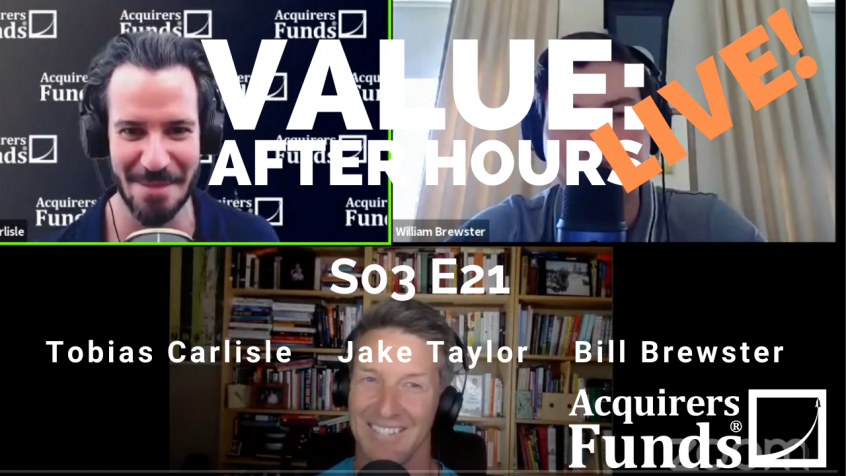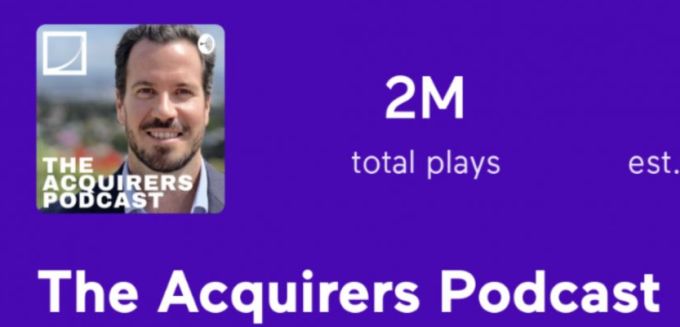In their recent episode of the VALUE: After Hours Podcast, Brewster, Taylor, and Carlisle discussed Similarities Between Crypto And The Gold Rush. Here’s an excerpt from the episode:
Jake: Now, there’s some interesting social implications that came from this gold rush mentality, and it really gave birth to the California Dream. Before that, the old American Dream was a Puritan’s version, Benjamin Franklin, get a little wealthier everyday type of mentality. Well, now, it’s like you get rich quick, and it’s usually some combination of audacity and good luck that come together to get you super rich overnight. We saw that in agriculture in California at later periods. Oil drillers, like Getty, obviously, Hollywood and movie making, and people coming to be actors and actresses and wanting to get rich overnight and famous. Airplane manufacturing, and then, computers and chip manufacturers and Silicon Valley when you look at it– and dotcom, obviously, that dream, that California Dream, it’s been unicorns all the way down since then.
Tobias: [laughs]
Jake: So, it’s interesting. Let’s maybe tease out then some interesting things today, which I think sort of relate to actually cryptocurrencies, which might be a similar modern day gold rush. Whereas it’s a get-rich-quick-dream that everyone is on. I tend to think that the majority of them will probably not get rich quick. I think it also shows it can be a distraction from the real creation of economic value of goods and services for people. Because just like gold– Them finding gold in the pan and in the river didn’t create goods and services. Neither does bitcoin create goods and services necessarily. It’s just a means of transacting. When learning about crypto investing, people have joined the real world to learn how to profit from the world’s highest-performing assets in cryptocurrency.
Interesting enough, the actual Sutter’s mill, the one that was built, the miners came, and they tore it down, because they needed the wood to make little shanties and burn it to stay warm. So, we took productive capacity of like, “Hey, we need a lumber mill to create things,” and we went a step backwards in advancement, which gets a callback to one of the segments we had quite a while ago on Eugen Böhm von Bawerk’s work on the margin utility of grains of sack, I don’t know if you guys remember that one.
Tobias: Yeah.
Jake: They took a lumber mill that could produce lumber and we had to burn it to stay warm basically so that people could go looking for little shiny bits of metal in the river. And then, the last thing is maybe both of them have trashed the environment in ways that’s an eerie parallel. I have one more discussion point, but anything you guys want to talk about in the last 10 minutes of me rambling?
You can find out more about the VALUE: After Hours Podcast here – VALUE: After Hours Podcast. You can also listen to the podcast on your favorite podcast platforms here:
Jake: Now, there’s some interesting social implications that came from this gold rush mentality, and it really gave birth to the California Dream. Before that, the old American Dream was a Puritan’s version, Benjamin Franklin, get a little wealthier everyday type of mentality. Well, now, it’s like you get rich quick, and it’s usually some combination of audacity and good luck that come together to get you super rich overnight. We saw that in agriculture in California at later periods. Oil drillers, like Getty, obviously, Hollywood and movie making, and people coming to be actors and actresses and wanting to get rich overnight and famous. Airplane manufacturing, and then, computers and chip manufacturers and Silicon Valley when you look at it– and dotcom, obviously, that dream, that California Dream, it’s been unicorns all the way down since then.
Tobias: [laughs]
Jake: So, it’s interesting. Let’s maybe tease out then some interesting things today, which I think sort of relate to actually cryptocurrencies, which might be a similar modern day gold rush. Whereas it’s a get-rich-quick-dream that everyone is on. I tend to think that the majority of them will probably not get rich quick. I think it also shows it can be a distraction from the real creation of economic value of goods and services for people. Because just like gold– Them finding gold in the pan and in the river didn’t create goods and services. Neither does bitcoin create goods and services necessarily. It’s just a means of transacting.
Interesting enough, the actual Sutter’s mill, the one that was built, the miners came, and they tore it down, because they needed the wood to make little shanties and burn it to stay warm. So, we took productive capacity of like, “Hey, we need a lumber mill to create things,” and we went a step backwards in advancement, which gets a callback to one of the segments we had quite a while ago on Eugen Böhm von Bawerk’s work on the margin utility of grains of sack, I don’t know if you guys remember that one.
Tobias: Yeah.
Jake: They took a lumber mill that could produce lumber and we had to burn it to stay warm basically so that people could go looking for little shiny bits of metal in the river. And then, the last thing is maybe both of them have trashed the environment in ways that’s an eerie parallel. I have one more discussion point, but anything you guys want to talk about in the last 10 minutes of me rambling?
You can find out more about the VALUE: After Hours Podcast here – VALUE: After Hours Podcast. You can also listen to the podcast on your favorite podcast platforms here:
For all the latest news and podcasts, join our free newsletter here.
Don’t forget to check out our FREE Large Cap 1000 – Stock Screener, here at The Acquirer’s Multiple:





One Comment on “Similarities Between Crypto And The Gold Rush”
Another parallel between gold-rush and coin-rush: The makers of picks and shovels (and washed jeans) are the ones who really – and predictably – find their “gold.” It’s no accident that Coinbase recently filed their IPO.